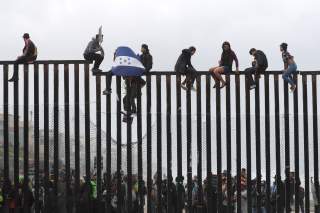America's Immigration Policy Needs an Overhaul
These several steps toward meaningful reform present an intelligent and rules-based approach to immigration in the twenty-first century.
People respond to incentives. Some incentives to immigration will hopefully never change: our freedoms, a strong economy, safety, a chance to start over. However, other incentives must be changed: the relative ease to find a job without legal status, the low risk of deportation for overstaying one’s visit, the knowledge that eventually you will likely be able to bring your family to the United States, and the knowledge that even if you illegally immigrate, any child you have in the United States will be a citizen and can later make you a citizen. Congress made the laws that help incentivize immigration by any means available. The executive branch’s selective enforcement of laws has also incentivized bad behavior. To remove some of these incentives, we should:
– End family reunification as the overriding basis for U.S. immigration policy. Citizens should be able to marry and/or adopt foreign nationals and bring them to the United States. However, citizens should no longer be able to bring their parents, children over the age of eighteen, brothers, and sisters to the United States.
– End birthright citizenship for the children of those improperly in the United States. It is possible to visit the United States legally to have a baby. It is possible to be in the United States legally and become pregnant. These children should be citizens as their parents were here legally. Nothing onerous would need doing to prove citizenship or proper status to register a birth. Citizens could produce their state-issued birth or naturalization certificates to prove their citizenship to register the birth of their children. Non-citizens legally present would simply need to bring the DHS issued forms validating their status.
– Prosecute both criminally and civilly executives and companies, which employ illegal immigrants. We have already seen decreases in illegal immigration when job opportunities decrease.
With these incentives removed, the United States can continue to step up security. Security comes through enforcement. Enforcement deters lawbreaking. To promote security, we should:
– Continue deporting those in the country illegally, including those who overstay legal visits.
– Continue to secure the borders. More barriers can be helpful and have had bipartisan support in the past. More patrols by both humans and drones may be helpful. Assisting other countries so people will not be so desperate to leave could also help.
After removing some of the incentives and stepping up security, the United States should then:
– Make a new immigration policy based on merit, not blood. Under this idea, companies, universities, and hospitals would determine future immigrants. They would file petitions for the workers they need. Individuals could be interviewed for eligibility to receive a visa allowing them and any spouses or minor children to immigrate permanently to the United States. However, care must be taken to ensure these individuals are not undercutting American workers.
– Create a solid, enforceable guest worker program. Family members would not accompany guest workers. Estimates vary on how many guest workers are needed. Guest workers who violate the terms of this program would need to be swiftly deported and not permitted to return.
Two other parts of our immigration policies merit a mention as well. One, the Diversity Visa lottery, should be ended. This fraud-ridden program that randomly selects immigrants is neither helpful nor necessary in 2019. Second, we must maintain refugee visas. That the United States seeks out refugees to give them a second chance should be a source of immense pride. It also pays homage to our forefathers, many of whom could have been considered refugees.
The final step to be taken, once the above changes have been made, is to legalize anyone who can prove that they have lived in the United States for more than five years. This will be complicated and messy, but necessary and humane. Our current policies created our current mess. It is up to us to fix it. It is immoral and wrong to have eleven million people living illegally in the United States. It undermines the rule of law. These eleven million represent everything that is wrong with the current framework.
All of these steps together would present an intelligent and rules-based approach to immigration in the twenty-first century. Critics may claim the changes are too radical. However, radical change is needed to bring our policies into the twenty-first century. This is not the time for tinkering. A law passed in 1965 is no longer appropriate for 2019. People will always seek to immigrate to the United States to provide a better life for their families and to pursue the American dream. As Americans, it is our duty to ensure that that dream is not only achievable for newcomers, but also for those already here. The United States wants and needs immigrants. These changes would benefit America and the majority of Americans. As Harvard professor George Borjas noted in a great column outlining many of the consequences of the current framework, if you are not for America, then who are you for?
Michael W. Gray is a Foreign Service Officer with the Department of State. He has spent eleven years overseas covering political and economic affairs from Pakistan to Germany. He currently instructs new political and economic officers preparing to go overseas for their first reporting assignments. Michael has been featured on the podcast, “The American Diplomat.” Prior to joining the Department of State, Michael served in the Peace Corps in Uzbekistan, attended law school, and graduated from Tulane University. The views expressed are his own.
Image: Reuters

